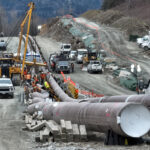From Bloomberg
Canada’s energy regulator recommended approval of the government-owned Trans Mountain pipeline expansion, clearing one of the major obstacles for the project to move forward.
The National Energy Board said in its report released Friday that it would impose 156 conditions on the project if the government ultimately approves it, and the regulator made an additional 16 non-binding recommendations to the government. The government of Canada had directed the NEB to look at the project again, examining in particular marine shipping risks, after a court ruling last August struck down its initial approval from 2016.
The NEB’s recommendation represents one of two key hurdles that Trans Mountain — a highly anticipated lifeline for Alberta’s pipeline-starved oil producers — needed to clear in order to move forward after the federal court found the project’s regulatory review was inadequate. The government also was required to conduct more consultations with indigenous people along its route, and those meetings are ongoing.
The Canadian government bought the pipeline last year, and now has to make a final decision on whether to build the expansion of the project it now owns. It has 90 days to make the decision, though it has indicated it will take as long as it needs to make a final judgment, Robert Steedman, chief environment officer of the National Energy Board, said at a press conference in Calgary.
‘Important Milestone’
Canadian Natural Resources Minister Amarjeet Sohi said the report was an “important milestone” in the response to last year’s court ruling, and will inform the government’s ongoing indigenous consultations.
“We are hopeful the work we are doing will put us in a strong position to make a decision within the NEB’s legislated timeframe,” he said.
That timeframe is officially 90 days, but the government can extend it.
The Trans Mountain expansion would roughly triple the capacity of the more than 60-year-old line, helping carry almost 600,000 more barrels of oil and fuels a day from Edmonton to a shipping terminal near Vancouver, where they could be loaded onto tankers and shipped to markets in Asia.
Adverse Effects
Shipping is “likely to cause significant adverse environmental effects” on area whales, and on indigenous use associated with the whales, while the NEB found greenhouse gas emissions from shipping will likely be significant, the regulator said. But the agency considers those risks justified “in light of the considerable benefits of the project and measures to minimize the effects.”
Of the 156 conditions included in the NEB report, only six were revised from the project’s previous approval. The revisions require the project to file plans for preventing and responding to spills and protecting marine mammals, and confirm vessel and operations standards. None of the new conditions are related to the pipeline’s construction.
The Canadian government bought Trans Mountain for C$4.4 billion ($3.5 billion) last year — paying what the country’s budget watchdog called “sticker price,” or at the high end of the estimated value — after Kinder Morgan Inc. threatened to abandon the project because of persistent delays. The government has vowed to get the expansion built and said it will not be a long-term owner of the pipeline.
Trans Mountain is one of three major pipelines that Alberta’s oil producers are counting on to help them move more of their crude to market. The others are Enbridge Inc.’s Line 3 expansion, scheduled to come into service in the fourth quarter, and TransCanada Corp.’s Keystone XL, which may begin construction later this year and go into service two or three years later.
The pipeline shortage has weighed on prices for Canadian heavy crude, prompting Alberta to order an unprecedented mandatory production cut to help alleviate the logjam and work down a glut of oil that had built up in storage. The shortage also prompted producers to ship more crude via costlier rail.






